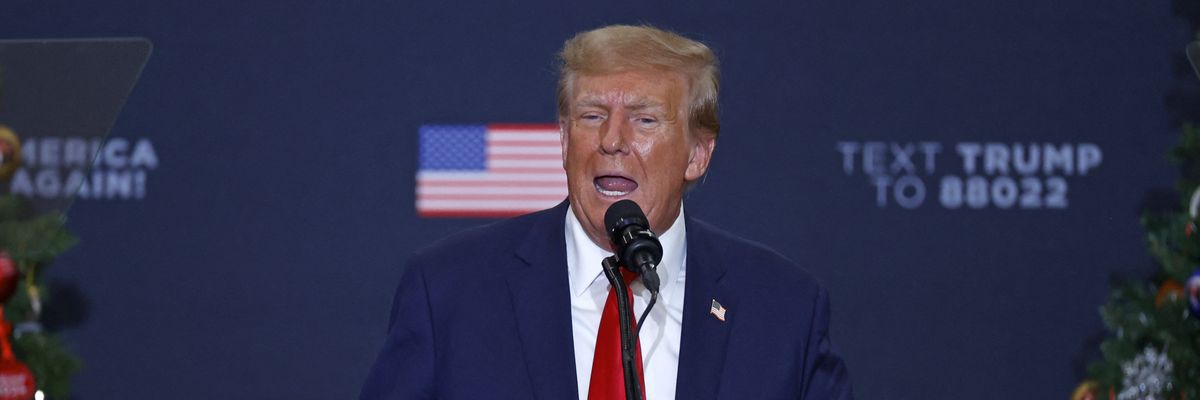After the Colorado Republican Party asked the U.S. Supreme Court to reverse a ruling that removed former President Donald Trump from the state GOP's 2024 primary ballot, the legal team for voters behind the initial case requested a swift decision.
The legal battle was launched in September by the government watchdog Citizens for Responsibility and Ethics in Washington (CREW) and law firms representing six GOP and unaffiliated Colorado voters, who argued that Section 3 of the 14th Amendment to the U.S. Constitution disqualifies Trump from holding office again because he incited the January 6, 2021 insurrection.
The Colorado Supreme Court last week overturned a lower court's decision and threw Trump off the state's primary ballot but also paused its ruling until January 4, to give the nation's highest court—which includes three Trump appointees—time to weigh in. Hoping the high court's right-wing majority will reverse the Colorado decision, the state party on Wednesday asked the justices to review and rule on the case by Super Tuesday, which is March 5, 2024, or if that's not possible, by the end of the current term.
The voters' legal representatives responded on Thursday with their own motion requesting a decision by February 11, explaining that "Colorado votes almost exclusively by mail" and clerks must mail ballots to many residents starting February 12.
One of the voters' attorneys, Sean Grimsley of Olson Grimsley Kawanabe Hinchcliff & Murray, said in a statement that "the ruling issued by the Colorado Supreme Court affirmed our clients' argument: Donald Trump engaged in insurrection after taking an oath to support the Constitution and is consequently disqualified from serving as president and barred from Colorado primary ballots."
"The Colorado Supreme Court's decision was well-rooted in the text and historical context of the 14th Amendment and they correctly applied those principles to the facts of this case," he continued. "The Colorado Republican Party's appeal of our clients' case will address an issue of exceptional national importance—whether, as the Colorado Supreme Court found, a former president, and current candidate for office, who has engaged in insurrection against the Constitution is disqualified from holding office again."
"We have filed a motion asking the United States Supreme Court to expedite their consideration of the Colorado Republican Party's appeal and any subsequent review on the issues so that the important question of Trump's eligibility can be resolved before nearly all primary voters cast their ballots," he added.
As Politico reported Thursday:
The state GOP's petition argues three points: The office of the presidency is not covered by the 14th Amendment, the insurrection clause is not "self-executing"—meaning Congress alone must enforce it, and states cannot make that determination on their own—and that by kicking Trump off the primary ballot, the state Republican Party's First Amendment rights of association have been violated.
The party is represented by the American Center for Law and Justice, a conservative Christian law group. Jay Sekulow, who defended Trump during his first impeachment trial, is the organization's chief counsel.
Colorado is the first state where Trump—the GOP's 2024 front-runner—has been barred from the primary ballot but it's not the only one where voters and advocacy groups, backed by legal scholars across the ideological spectrum, are challenging his eligibility. Free Speech for People (FSFP) is leading similar legal challenges in Michigan and Minnesota.
The Minnesota Supreme Court dismissed the case last month while the Michigan Supreme Court on Wednesday let stand a lower court ruling that the secretary of state lacks the legal authority to remove Trump from the ballot.
"We are disappointed by the Michigan Supreme Court's decision," said FSFP legal director Ron Fein. "The ruling conflicts with longstanding U.S. Supreme Court precedent that makes clear that when political parties use the election machinery of the state to select, via the primary process, their candidates for the general election, they must comply with all constitutional requirements in that process."
"However, the Michigan Supreme Court did not rule out that the question of Donald Trump's disqualification for engaging in insurrection against the U.S. Constitution may be resolved at a later stage," he added. "The decision isn't binding on any court outside Michigan and we continue our current and planned legal actions in other states to enforce Section 3 of the 14th Amendment against Donald Trump."
The owner of Minocqua Brewing Company, Kirk Bangstad, on Thursday filed a complaint with the Wisconsin Elections Commission seeking to remove Trump from the state's primary ballot, citing the 14th Amendment. The WEC refused to hear the complaint.
"It's pivotal that someone at least try in Wisconsin to do this," Bangstad told local reporters, vowing that "If WEC, and they will deny our complaint, we will sue in Dane County."
Meanwhile, in Maine, Democratic Secretary of State Shenna Bellows on Thursday barred Trump from the state's primary ballot.
